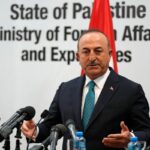
The United Nations’ human rights chief landed in China to begin an inquiry into abuses against Uyghur Muslims in Xinjiang on Monday, but Chinese authorities are severely limiting the trip with COVID-19 measures.
Human rights high commissioner Michelle Bachelet attempted to temper expectations prior to her arrival on Monday, saying the trip was not an “investigation.” Bachelet will visit two locations within the Xinjiang region, where China’s human rights abuses against Uyghurs have been widely documented.
She has agreed to stay within a “closed loop” of individuals set up by Chinese Communist Party (CCP) officials in Beijing, however. CCP officials say the measures are an effort to combat the spread of COVID-19.
No members of the press will be permitted to follow Bachelet on the trip.
CHINA IMPOSES SANCTIONS ON US OFFICIALS OVER XINJIANG
Bachelet has faced warnings from human rights activists that moving forward with the trip despite severe limitations on her access could harm the U.N.’s credibility moving forward.
“Should the high commissioner fail to obtain the necessary access for a meaningful investigation, the credibility of the office could suffer lasting damage, and the ability for the UNHCHR to secure meaningful future investigations may well be compromised,” the InterParliamentary Alliance on China (IPAC) told The Guardian. “Covid restrictions must not be deployed as a reason to excuse the PRC [People’s Republic of China] for failing to allow a meaningful investigation.”
HARVARD PROFESSOR CHARLES LIEBER CONVICTED OF HIDING TIES TO CHINA
China has been accused of wrongfully imprisoning up to three million Uyghurs in the Xinjiang region, as well as carrying out forced sterilizations and abortions. Chinese authorities claim camps in the region are “re-education” facilities combating Islamic extremism.
There is overwhelming evidence to suggest China is in fact carrying out a cultural genocide against Uyghurs. President Joe Biden’s administration has the abuses as such.
Congress passed the Uyghur Forced Labor Prevention Act in December, a bipartisan piece of legislation that prevents the importation of goods made via forced labor in the Xinjiang region.
Bachelet will deliver a public press briefing regarding her findings on May 28.




